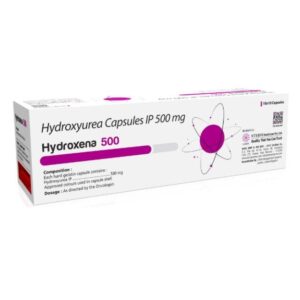HYDROXYUREA
HYDROXYUREA: Hydroxyurea is a medication used in the treatment of various conditions, including certain types of cancer, sickle cell disease, and certain bone marrow disorders. It is classified as an antineoplastic or cytotoxic agent.
The mechanism of action of hydroxyurea involves its ability to inhibit the enzyme ribonucleotide reductase, which plays a crucial role in the synthesis of DNA. By inhibiting this enzyme, hydroxyurea inhibits DNA synthesis and thus prevents the rapid growth and division of cancer cells.
In the treatment of sickle cell disease, hydroxyurea promotes the production of fetal hemoglobin (HbF), which helps to reduce the occurrence of sickle-shaped red blood cells. This can decrease the frequency of vaso-occlusive crises and improve overall symptoms in individuals with sickle cell disease.
The dose of hydroxyurea can vary depending on the condition being treated. For cancer, the dose is typically based on body weight and administered as capsules taken orally. For sickle cell disease, the dose is usually determined based on the individual’s blood cell counts and adjusted over time.
Common side effects of hydroxyurea can include gastrointestinal upset, loss of appetite, nausea, vomiting, diarrhea, and skin rash. Some individuals may also experience bone marrow suppression, leading to decreased production of red and white blood cells and platelets. Regular blood cell counts are typically monitored during hydroxyurea treatment to ensure the proper dosage and detect any potential side effects. Other less common side effects may include hair loss, fever, skin discoloration, or changes in nail condition.
It is important to note that hydroxyurea can have potentially harmful effects on a developing fetus, so it is crucial for individuals of reproductive age to use effective contraception during treatment. Pregnant women or those planning to become pregnant should consult with their healthcare provider before starting hydroxyurea.

